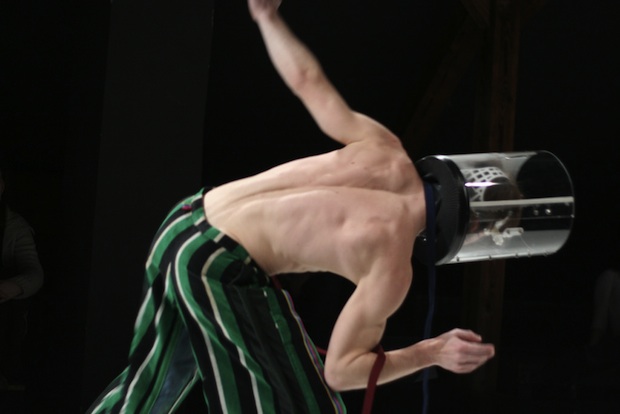Pace.V4 Touring Conference
konferencia o vzťahu umenia a politiky
streda 8. 6. 2016, 14.30 – 21.00
 Pace.V4 Touring Conference je formát putovnej konferencie, počas ktorej účastníci z celého sveta navštívia kultúrne a kreatívne centrá v krajinách V4. Stanica Žilina-Záriečie bude jednou zo zastávok konferencie. Okrem prezentácií našich projektov Stanice a Novej synagógy pre zahraničných účastníkov bude súčasťou programu predstavenie Jara Viňarského Butticula – Figúry blázna a konferencia tematizujúca vzťah politiky a umenia na Slovensku, zvlášť vo vzťahu k aktuálnemu politickému kontextu, cenzúre a autoritárskym tendenciám.
Pace.V4 Touring Conference je formát putovnej konferencie, počas ktorej účastníci z celého sveta navštívia kultúrne a kreatívne centrá v krajinách V4. Stanica Žilina-Záriečie bude jednou zo zastávok konferencie. Okrem prezentácií našich projektov Stanice a Novej synagógy pre zahraničných účastníkov bude súčasťou programu predstavenie Jara Viňarského Butticula – Figúry blázna a konferencia tematizujúca vzťah politiky a umenia na Slovensku, zvlášť vo vzťahu k aktuálnemu politickému kontextu, cenzúre a autoritárskym tendenciám.
Konferencia je otvorená pre verejnosť, komunikačným jazykom je angličtina.
Program:
14.30 – Marek Adamov - Predstavenie našej žilinskej operácie. Privítanie na Stanici.
14.50 – Ivana Rumanová – Čo tu škrípe? Umenie a politika na Slovensku. Úvod k téme konferencie.
15.10 – Fedor Blaščák – Machinácie umenia s politikou.
15.30 – Pauza a neformálna diskusia.
16.00 – Ivan Jurica – Myslieť očami. O neustálej radikalizácií a nedostatku radikálnej kritickej teórie.
16.20 – Milan Zvada, Rado Sloboda – Nie v našom meste. Kultúrne intervencie a reflexia lokálnej politiky.
16.40 – Martina Mašlárová – Psota na Slovensku.
17.00 – Pauza a neformálna diskusia.
18.00 – Návšteva rekonštrukcie Novej synagógy.
20.30 – Jaro Viňarský: Buticcula - Figúry blázna. (súčasný tanec)
Vstup je voľný s výnimkou tanečného predstavenia Buticcula, na ktoré je vstupné 5,00 a 3,00 € (dospelí / študenti).
Anotácia témy konferencie - Ivana Rumanová:
What Sucks Here? Art and Politics in Slovakia.
The conference will focus on the relation between art and politics in Slovakia and in a broader sense in the entire Central European region which has been marked recently by the power taking up of the various conservative, nationalist and extreme-right forces. In March 2016 a neo-fascist party has been elected to the Slovakian Parliament.
The need to do something mixed with the doubts whether the current situation is the result of the public / cultural sphere failure are very present in the post-elections discussions. But what is to be done and how to respond critically to the situation in which the critical discourse has been appropriated by the authoritarian movements?
In the text Lets do nothing Boris Buden reflects on the possibilities and limits of the public activism. By “doing nothing” he does not propose to accept a passive state of resignation but calls for a necessity to rethink the forms of artistic engagement that wouldn´t reproduce the dominant dichotomies and would come up with the new perspectives of seeing things instead.
Marián Kotleba, the leader of the neo-fascist party, has realized several highly publicized attacks against art and notably theatre in the last 6 months: As a regional governor he refused to sign the attributed grant subsidies to two theatres, he sent an official notice to the secondary school directors asking them not to participate at the theatre performances nor the discussions but to organize the beauty competitions instead. In March 2016 he interrupted a theatre performance that he was being a spectator of and that he had even commanded before. Seen out of context one could doubt whether these spectacular situations are not the critical art practices pointing out cynically to the lack of reflection in society and the abuse of power. And at the same time we can ask if Kotleba´s antagonistic interventions against theatre do not contribute paradoxically to strengthen the position of art as a potential contra scene to his politics.
So with the invited art practitioners and theoreticians we would like to discuss around the following issues:
How can art take over the critical discourse usurped by the authoritarian movements and create a space of complexity instead of the simplistic solutions?
How can contemporary art deal with the absolute values (Truth, Goodness, Beauty…) without reproducing the absolutist patterns? These values even if they´ve been relativized and deconstructed multiple times seem to gain the relevance in the times of instability and precarization.
To which extent is the current conservative and nationalist turn in Central Europe influenced by its peripheral position within EU? What´s the role of self-victimization and post-colonialist patterns in these processes?
















